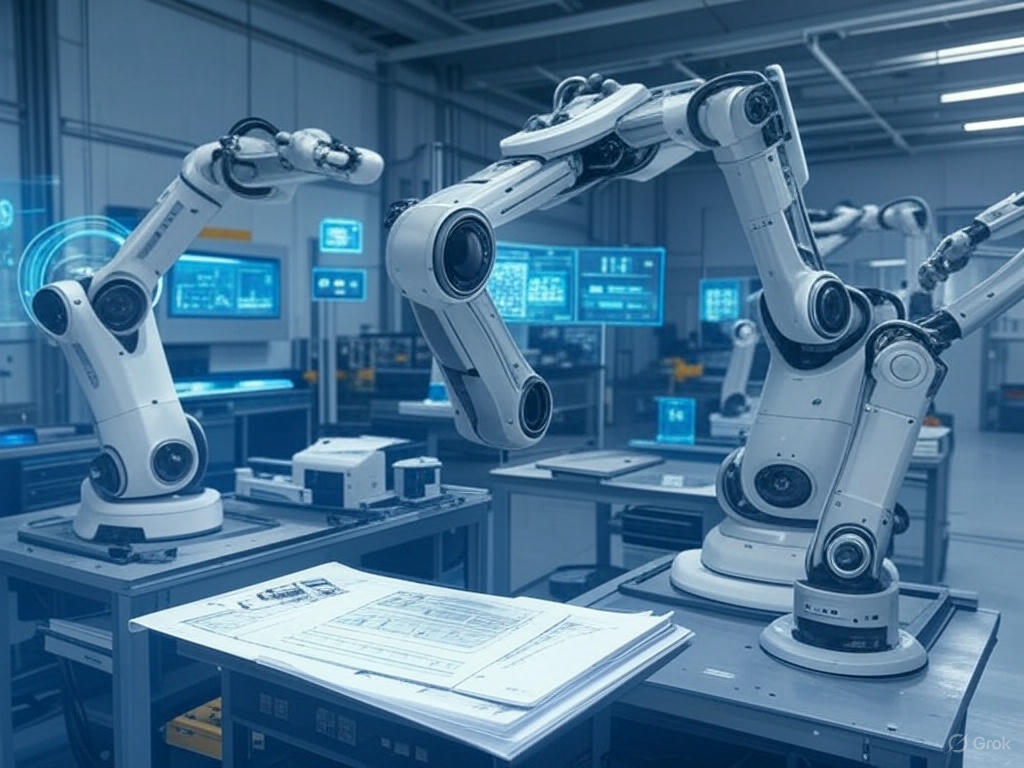Robotics Engineering
Robotics engineering is at the forefront of technological innovation, driving advancements in automation and intelligent systems. This multidisciplinary field combines elements of mechanical engineering, electrical engineering, computer science, and more to design and develop robots that can perform a variety of tasks with precision and efficiency.
Techno solution

Table of Contents
- Introduction
- What is Robotics Engineering?
- Key Components of Robotics
- Hardware
- Software
- Control Systems
- Applications of Robotics Engineering
- Manufacturing
- Healthcare
- Agriculture
- Space Exploration
- Consumer Robotics
- The Future of Robotics Engineering
- AI Integration
- Autonomous Systems
- Collaborative Robots (Cobots)
- Challenges and Ethical Considerations
- Job Displacement
- Safety Concerns
- Ethical Use of Robotics
- How to Pursue a Career in Robotics Engineering
- Education and Skills Required
- Career Opportunities
- Conclusion
- References
1. Introduction
Robotics engineering is at the forefront of technological innovation, driving advancements in automation and intelligent systems. This multidisciplinary field combines elements of mechanical engineering, electrical engineering, computer science, and more to design and develop robots that can perform a variety of tasks with precision and efficiency.
2. What is Robotics Engineering?
Robotics engineering involves the design, construction, operation, and use of robots. Engineers in this field create robots that can assist humans in performing tasks that are dangerous, repetitive, or require high precision. Robotics engineering encompasses both the development of physical robots and the software that controls them.
3. Key Components of Robotics
Hardware
The hardware of a robot includes its physical components, such as sensors, actuators, and the structural framework. These elements work together to allow the robot to interact with its environment and perform specific tasks.
Software
Robotic software includes the algorithms and programming that control the robot's movements and responses. This software enables the robot to process information from its sensors and make decisions based on that data.
Control Systems
Control systems are crucial for managing the behavior of robots. They integrate hardware and software to ensure that the robot operates smoothly and efficiently. These systems can range from simple feedback loops to complex AI-driven controllers.
4. Applications of Robotics Engineering
Manufacturing
In manufacturing, robots are used for tasks such as assembly, welding, and painting. They increase production efficiency, improve quality, and reduce the risk of injury to human workers.
Healthcare
Robotic engineering has led to the development of surgical robots, rehabilitation robots, and robotic prosthetics. These innovations enhance the precision of medical procedures and improve patient outcomes.
Agriculture
Robots in agriculture help with planting, harvesting, and monitoring crops. They increase agricultural productivity and enable precision farming practices.
Space Exploration
Robotic engineering is essential for space exploration, with robots like the Mars rovers performing tasks on other planets that are impossible for humans to accomplish directly.
Consumer Robotics
Consumer robotics includes products like robotic vacuum cleaners, lawn mowers, and personal assistants. These robots make everyday tasks easier and more convenient for users.
5. The Future of Robotics Engineering
AI Integration
The integration of artificial intelligence (AI) with robotics is leading to the development of smarter, more autonomous robots. These robots can learn from their environment and improve their performance over time.
Autonomous Systems
Autonomous robots are capable of performing tasks without human intervention. This technology is being applied in areas such as self-driving cars and unmanned aerial vehicles (UAVs).
Collaborative Robots (Cobots)
Cobots are designed to work alongside humans, enhancing their capabilities and ensuring safety. These robots are used in various industries to perform tasks that require human-robot collaboration.
6. Challenges and Ethical Considerations
Job Displacement
The increasing use of robots in various industries raises concerns about job displacement. It is important to address these concerns by promoting education and retraining programs for affected workers.
Safety Concerns
Ensuring the safety of humans working alongside robots is a critical issue. Robust safety protocols and advanced control systems are necessary to prevent accidents and injuries.
Ethical Use of Robotics
The ethical use of robotics involves ensuring that robots are used in ways that benefit society and do not cause harm. This includes considerations around privacy, security, and the potential misuse of robotic technology.
7. How to Pursue a Career in Robotics Engineering
Education and Skills Required
A career in robotics engineering typically requires a degree in engineering, computer science, or a related field. Essential skills include programming, knowledge of control systems, and a strong foundation in mathematics and physics.
Career Opportunities
Robotics engineers can find opportunities in various industries, including manufacturing, healthcare, automotive, and aerospace. Roles may involve research and development, design, testing, and maintenance of robotic systems.
8. Conclusion
Robotics engineering is a dynamic and rapidly evolving field that is transforming industries and enhancing our daily lives. As technology advances, the potential for robotics to improve efficiency, safety, and quality of life continues to grow.
9. References
For more information on robotics engineering, you can visit the following resources:
- IEEE Robotics and Automation Society
- MIT Robotics
- Robotics Online
- International Journal of Robotics Research
Robotics engineering is paving the way for a future where robots and humans work together seamlessly. The advancements in this field are not only making tasks easier but also opening new possibilities for innovation and development across various sectors.